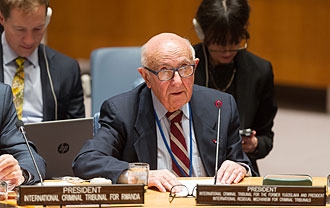The Tribunal’s President, Judge Theodor Meron, today updated the United Nations Security Council on the achievements of the ICTY over the past six months and the challenges the Tribunal has faced in the completion of its mandate.
The President provided an update on the ICTY’s completion of its remaining trials and appeals. President Meron described how, in 2015, the Appeals Chamber had rendered two judgements -- in the large, multi-accused Popović et al. case and in the complex Tolimir case. He noted that by the end of this year, the forecasts provided by presiding Judges indicate that the ICTY will have completed its work on all but two trials and two appeals.
The President explained that although the Tribunal’s work is progressing, it has faced various challenges that have led to delays in trial and appeal cases. The President reassured the Council that, while various cases have suffered delays, the last cases are still expected to be completed in 2017 as predicted in the ICTY’s previous forecasts.
President Meron went on to describe in more detail two major challenges that the Tribunal is facing in the completion of its work: the health of certain defendants and the retention of Tribunal staff. He observed that the Hadžić trial was currently adjourned for reasons relating to the defendant’s health and that the Mladić trial has been limited to four sitting-days per week following medical advice.
President Meron explained that while adverse health developments involving defendants are, by their nature, difficult to predict, “Judges sitting on the benches in the affected cases make every effort to limit delays linked to these factors, while ensuring that the Tribunal meets its obligation to provide detainees with appropriate medical care....”
The President then drew attention to the challenge of staff attrition, particularly among mid-level and senior-level members of legal drafting teams assigned to support the work of the Judges, and its potential impact on the Tribunal’s judgement delivery forecasts. President Meron noted that all possible steps have been taken in order to address this challenge, underscoring that “the Tribunal must continue and redouble its efforts to adopt strategies that reduce any delays in ongoing cases to a minimum…”
President Meron concluded by discussing the Tribunal’s ground-breaking work. The President underscored the material effect that increased worldwide support for international criminal tribunals has had on the conduct of war and on reducing the suffering of those affected by conflict. He reflected that “the Tribunal’s contributions to ending impunity for international crimes continue to serve as a momentous symbol of the international community’s commitment to bringing justice for crimes committed in the Yugoslav wars, and to the laudable aim of preventing grave crimes, like those that hang so heavily in any historical account of the past century, from being committed again.”


